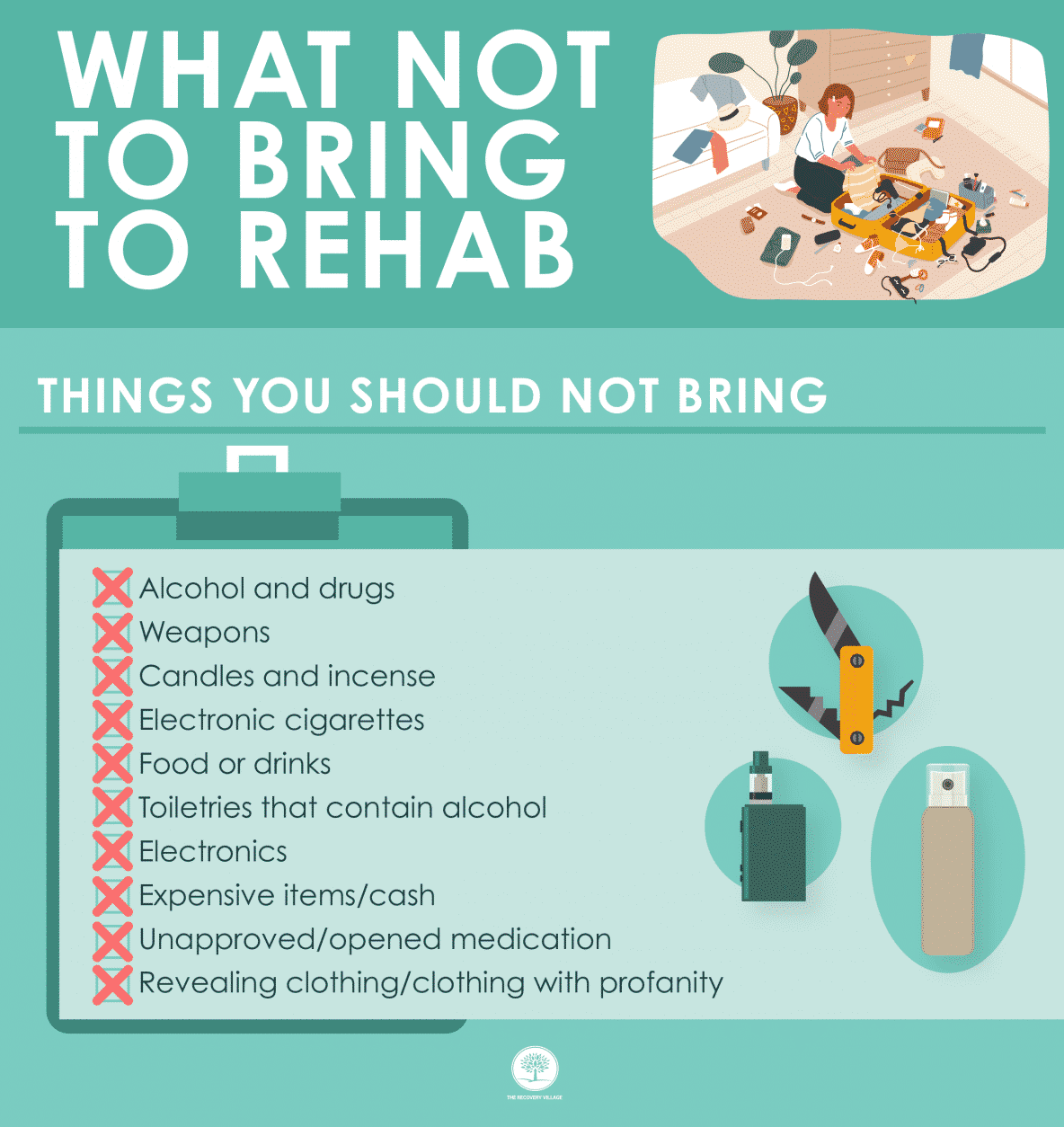Heading to a drug rehab program can be a life-changing decision, but you shouldn’t have to waste time and thinking about what to pack. This list will prepare you for your stay at a treatment program.
Making the decision to enter rehab may be the best choice you’ll ever make. The early stages of recovery can lead to a healthier life without the use of drugs or alcohol.
When you’re preparing to head to addiction treatment, your thoughts may swirl endlessly as you imagine what lies ahead. You might wonderwhat will happenwhen you get there, what treatment will be like andwhat you should bringwith you.
You can prepare yourself for rehab by bringing certain items and leaving others behind. Drug rehab programs often have strict rules about what you can and cannot bring in with you. They do this to ensure your safety and create a comfortable environment for recovery.
Things You Should Not Bring to Rehab
Each facility has its own rules, but most centers have similar guidelines about what not to bring to treatment. Items that may not be permitted in rehab include:
Treatment Can Be Life Changing. Reach out today.
Whether you are struggling with addiction, mental health or both, our expert team is here to guide you every step of the way. Don’t wait— reach out today to take the first step toward taking control of your life.
- Alcohol and drugs:This one might seem obvious, but some people may believe that bringing last-minute drug items to rehab can help them transition. Whether the drugs are legal or not, bringing substances into rehab can create a problematic situation for you, the staff and other patients.
- Weapons:Leave any and all weapons at home. This includes guns, knives, scissors or any sharp objects that may be viewed as dangerous. In some cases, even items that seem harmless like nail clippers could be forbidden, so it’s best to check with your specific program ahead of time, or just leave these items at home.
- Candles and incense:People may use candles or incense as a way to destress or create a calm environment, but in rehab, they are usually not permitted.
- Electronic cigarettes:Many rehab programs permit tobacco use throughout treatment, but fewer allow vaping and e-cigarettes. One possible explanationfor this is the ease in which people can swap out nicotine for marijuana or THC in their vape. Access to this substance could spark significant issues in the center.
- Food or drinks:Outside food and drinks are typically banned because centers provide nutritious meals to complement treatment plans. Meals, snacks and beverages will usually be provided, especially duringmedical detoxandinpatient programming. If you have special dietary requirements, let the rehab center know before you’re admitted and they can plan to prepare the foods that fit your needs.
- Toiletries that contain alcohol:For your safety and the safety of others, leave behind any alcohol-based products like certain mouthwashes, nail polish remover, perfume and aerosols. Basic, alcohol-free toiletries are often provided by treatment centers.
- Revealing clothing or clothing with profanity:Because rehab is about healing, do not bring any clothes that reference drugs, alcohol or profanity. Wearing comfortable clothing that is not overly revealing can help you and others focus on recovery.
- Electronics:Leave behind game consoles, televisions, tablets, cameras, laptops and smartphones. Most rehab centers don’t want you to be distracted by electronics or use devices that connect to the internet. Disconnecting from the outside world helps maintain a focus on recovery and privacy for everyone at the facility.
- Expensive items and cash:Leave behind any expensive items like jewelry, clothes, shoes and large amounts of money.
- Unapproved or opened medication:Leave behind any unapproved medicines. If you have vitamins or unopened medication, advise the staff before you enter rehab.
Other Things That Are Discouraged in Drug Rehab
Items like weapons, illegal substances and electronics are not the only things that can take away from your rehab experience. There are other emotional and behavioral responses that are also discouraged in drug rehab, including:
- A negative attitude:Keep an open mind and leave your negativity at the door. Not only can your negativity hinder your progress, but it could also impact other clients who are seeking healing.
- Unwillingness to participate:No matter what you’ve been led to believe or what you’ve experienced during previous experiences, professional addiction treatment can be transformative, especially when you are emotionally and mentally invested and ready. Taking part in your recovery is important for long-term healing.
- Disregard for the rules of the program:Some individuals may try to rebel against the rules of a rehab program. They may challenge staff and confront peers in an attempt to gain power, especially if they feel they have lost control because of addiction. Recognizing that you need help and participating in a rehab program’s regulations can help you maintain a safe environment for everyone in treatment.
Time spent in a drug or alcohol rehab program can help you find lasting health through recovery. In order to best serve you and other clients, rehab programs often have rules and regulations in place. Following these guidelines can help maintain a safe and positive environment for healing.
If you or someone you know is struggling with addiction, a drug rehab program can help.Call The Recovery Villageto learn more about comprehensive, empowering treatment programs to fit your needs.







